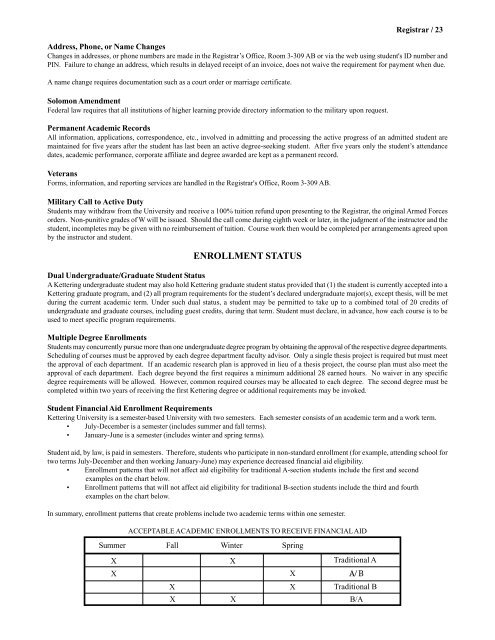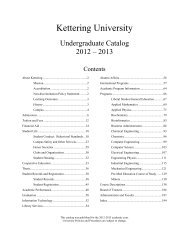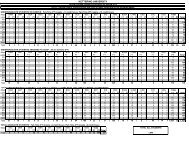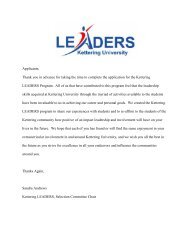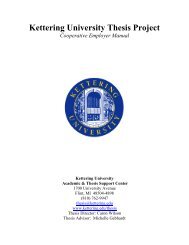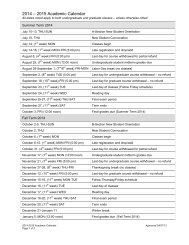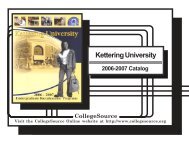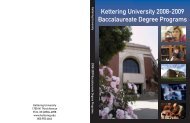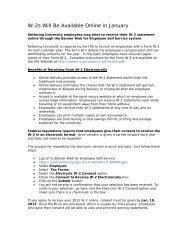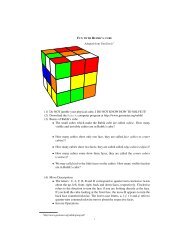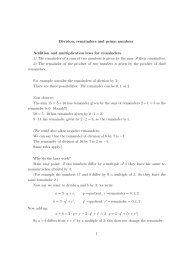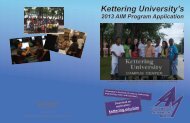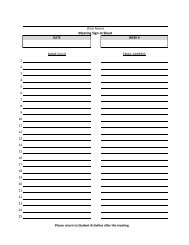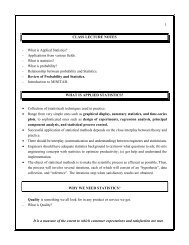2007-2008 Undergraduate Catalog - Kettering University
2007-2008 Undergraduate Catalog - Kettering University
2007-2008 Undergraduate Catalog - Kettering University
You also want an ePaper? Increase the reach of your titles
YUMPU automatically turns print PDFs into web optimized ePapers that Google loves.
Registrar / 23<br />
Address, Phone, or Name Changes<br />
Changes in addresses, or phone numbers are made in the Registrar’s Office, Room 3-309 AB or via the web using student's ID number and<br />
PIN. Failure to change an address, which results in delayed receipt of an invoice, does not waive the requirement for payment when due.<br />
A name change requires documentation such as a court order or marriage certificate.<br />
Solomon Amendment<br />
Federal law requires that all institutions of higher learning provide directory information to the military upon request.<br />
Permanent Academic Records<br />
All information, applications, correspondence, etc., involved in admitting and processing the active progress of an admitted student are<br />
maintained for five years after the student has last been an active degree-seeking student. After five years only the student’s attendance<br />
dates, academic performance, corporate affiliate and degree awarded are kept as a permanent record.<br />
Veterans<br />
Forms, information, and reporting services are handled in the Registrar's Office, Room 3-309 AB.<br />
Military Call to Active Duty<br />
Students may withdraw from the <strong>University</strong> and receive a 100% tuition refund upon presenting to the Registrar, the original Armed Forces<br />
orders. Non-punitive grades of W will be issued. Should the call come during eighth week or later, in the judgment of the instructor and the<br />
student, incompletes may be given with no reimbursement of tuition. Course work then would be completed per arrangements agreed upon<br />
by the instructor and student.<br />
ENROLLMENT STATUS<br />
Dual <strong>Undergraduate</strong>/Graduate Student Status<br />
A <strong>Kettering</strong> undergraduate student may also hold <strong>Kettering</strong> graduate student status provided that (1) the student is currently accepted into a<br />
<strong>Kettering</strong> graduate program, and (2) all program requirements for the student’s declared undergraduate major(s), except thesis, will be met<br />
during the current academic term. Under such dual status, a student may be permitted to take up to a combined total of 20 credits of<br />
undergraduate and graduate courses, including guest credits, during that term. Student must declare, in advance, how each course is to be<br />
used to meet specific program requirements.<br />
Multiple Degree Enrollments<br />
Students may concurrently pursue more than one undergraduate degree program by obtaining the approval of the respective degree departments.<br />
Scheduling of courses must be approved by each degree department faculty advisor. Only a single thesis project is required but must meet<br />
the approval of each department. If an academic research plan is approved in lieu of a thesis project, the course plan must also meet the<br />
approval of each department. Each degree beyond the first requires a minimum additional 28 earned hours. No waiver in any specific<br />
degree requirements will be allowed. However, common required courses may be allocated to each degree. The second degree must be<br />
completed within two years of receiving the first <strong>Kettering</strong> degree or additional requirements may be invoked.<br />
Student Financial Aid Enrollment Requirements<br />
<strong>Kettering</strong> <strong>University</strong> is a semester-based <strong>University</strong> with two semesters. Each semester consists of an academic term and a work term.<br />
• July-December is a semester (includes summer and fall terms).<br />
• January-June is a semester (includes winter and spring terms).<br />
Student aid, by law, is paid in semesters. Therefore, students who participate in non-standard enrollment (for example, attending school for<br />
two terms July-December and then working January-June) may experience decreased financial aid eligibility.<br />
• Enrollment patterns that will not affect aid eligibility for traditional A-section students include the first and second<br />
examples on the chart below.<br />
• Enrollment patterns that will not affect aid eligibility for traditional B-section students include the third and fourth<br />
examples on the chart below.<br />
In summary, enrollment patterns that create problems include two academic terms within one semester.<br />
ACCEPTABLE ACADEMIC ENROLLMENTS TO RECEIVE FINANCIAL AID<br />
Summer<br />
Fall<br />
Winter<br />
Spring<br />
X<br />
Traditional A<br />
X<br />
X<br />
A/B<br />
X<br />
X<br />
X<br />
X<br />
X<br />
Traditional B<br />
B/A


